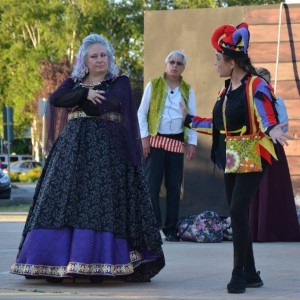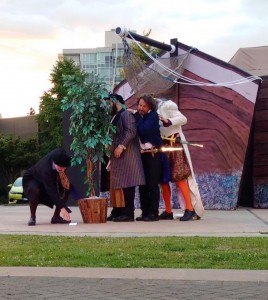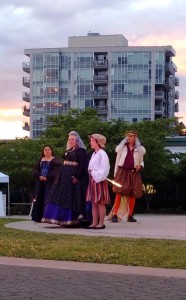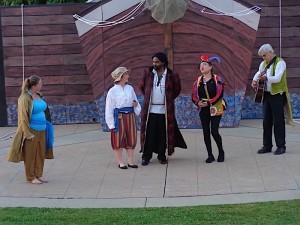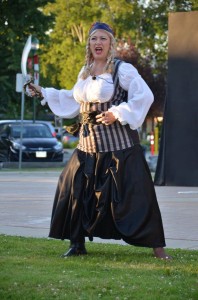I’ve been involved in community theatre for over 20 years. I once directed a youth production that involved various selected scenes from several of Shakespeare’s plays but I’ve never been in a Shakespearean production, until this year. Last year I got involved with Emerald Pig Theatrical Society in Maple Ridge. Their summer production is always one of Shakespeare’s plays. As they perform on the bandstand in the park near the Leisure Centre in Maple Ridge, among other places, they call this part of their group “Bard on the Bandstand”. Well, this year I had the time to commit to it, so I screwed up my courage and auditioned. As this was the twelfth year of presenting their work, they were doing Twelfth Night.
I had prepared a short monologue from “The Merry Wives of Windsor”. The internet is an amazing resource! It was saucy and irreverent and I thought I could do it justice. I wasn’t able to memorize it as I was involved with learning my lines for another play, but I became very familiar with it. As I worked it, I realized that although the syntax was different, the language was clear. It made sense! With that knowledge giving me confidence, I worked on my character and went to the audition. There were familiar faces behind the table and after some friendly conversation, I delivered the monologue. It went well. Then the director asked me to read a part from the play.
I had read the play and done some research on it, so I was surprised when I was asked to read a monologue delivered by the pirate Antonio. I hadn’t really paid much attention to him as I was reading so I wasn’t too familiar with his parts. I quickly scanned the page and asked a few questions to buy myself a few minutes. Then, rolling my r’s in classic pirate form and standing with my feet firmly planted, I read the monologue. It made sense and I thought I had done it justice. I returned the page to the table, thanked everyone and went home.
A while later I got a call, offering me the part of Antonia. They had changed the part to a female pirate captain, who is in love with a young man she has rescued from a shipwreck. Well, well. That’s a part I could play, in fact, I believe I have had to play “nice” with several wonderful young-er men on stage. At the first read-through I was incredibly impressed with the cast. When Shakespeare is read properly it makes perfect sense. As I said earlier the syntax is different and some of the words are out of use now, but when you read it like a story, paying attention to the punctuation, it makes perfect sense. When you add in the acting, the body movement and the facial expressions, well, it’s magical.
As the rehearsals went in, I became more pirate-y. With my bad knee it was easy to limp like I had a peg leg. I started using a basic Irish accent, with dramatic rolled r’s. I often stood with my feet planted strongly and my hands on my hips. I was blatantly physical with the delightful young man who played my reluctant love interest. The director kept telling me to play bigger and do more and soon I was swaggering, with my curved blade drawn, across the stage.
My biggest worry about doing Shakespeare was what I would do it I drew a blank on stage. It sometimes happens. Your mind wanders and suddenly you have no idea what you’re supposed to say next. In a “regular” play, you know the purpose of the scene and you know your character so you can make something up until you get back on track. But how do you improvise Shakespeare? Well, not surprisingly, it’s exactly the same. Sure the Bard used phrases like “by my troth” and “forsooth my lady” but a lot of his language is very similar to how we speak today. And getting into the rhythm of his writing becomes almost natural as you rehearse. So when you, or your cast mates, draw a blank on stage during one of Shakespeare’s play, you get out of it the same way you’d get out of it in any other play.
My admiration and respect for my cast mates grew as we worked the play. I’ve said this before, but I have constantly been impressed with the talent shown in community theatre. Sure there’s been the occasional actor who has more enthusiasm than ability, and sometimes the only reason someone is on stage is because they showed up and there was no one else to cast, but for the most part, community theatre actors are great. We work day jobs to pay our bills but our passion is theatre and given half a chance most of us would jump at the chance to make a living doing it. This cast gelled and we delivered amazing performances every night. Of course we made mistakes but we covered for each other and moved on. And since every director edits Shakespeare’s words differently, no one watching could say we’d missed something; it just might have been cut.
I’m not sure if I’ll do another summer Shakespearean show but at least now I can say I have done it, and that’s more than a lot of people can say.

